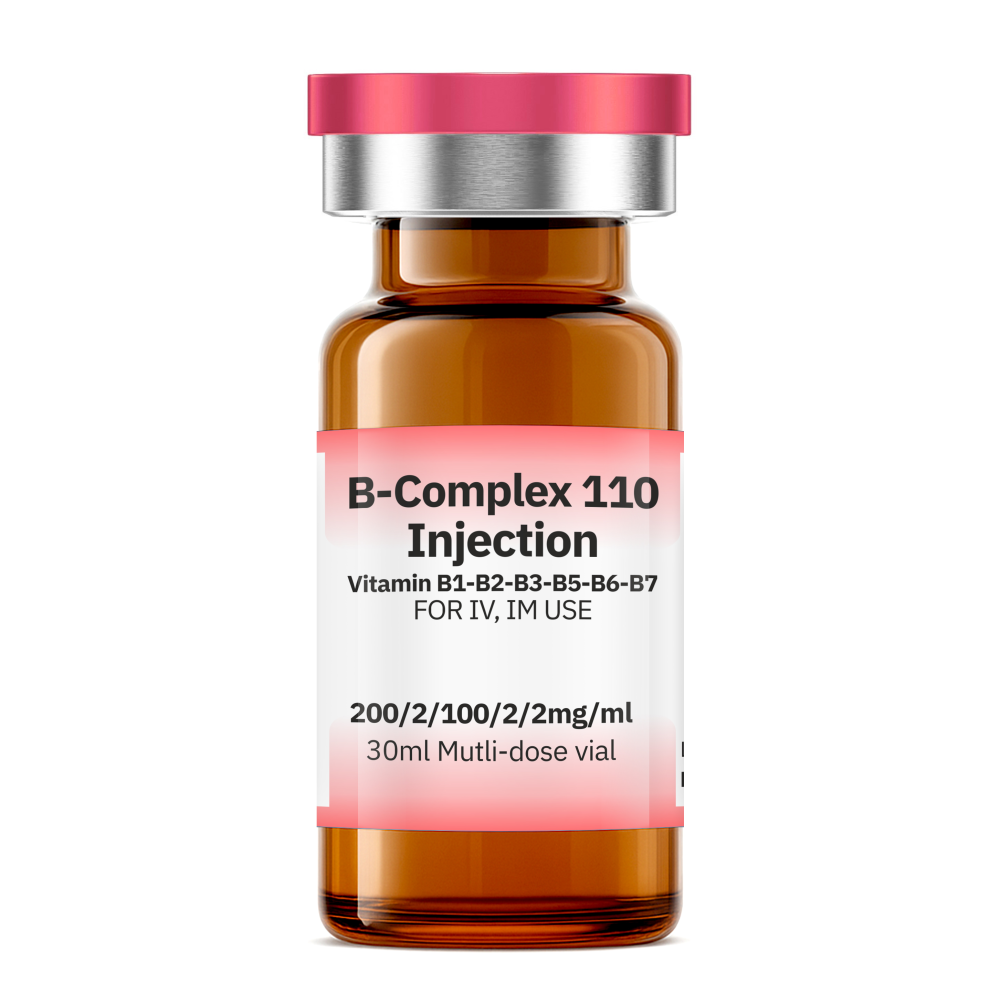
B-Complex 110
Our B-complex injection includes a combination of the following B vitamins:
Vitamin B1 (Thiamine): Essential for energy production and nerve function.
Vitamin B2 (Riboflavin): Important for energy production and skin health.
Vitamin B3 (Niacinamide): Helps with digestion, skin health, and converting food into energy.
Vitamin B5 (Dexpanthenol): Crucial for the synthesis of coenzyme A, which is involved in fatty acid metabolism.
Vitamin B6 (Pyridoxine): Important for protein metabolism and cognitive development.
Vitamin B7 (Biotin): Supports healthy skin, hair, and nails.
Available to ship to your site 8-10 weeks after ordered
-
30mL
-
B-1 Thiamine 100mg/ml
B-2 Riboflavin 4mg/ml
B-3 Niacinamide 100mg/ml
B-5 Dexpanthenol 4mg/ml
B-6 Pyridoxine 10mg/ml
B-7 Biotin 0.1mg/ml
Intramuscular (IM) Injection
Procedure: The injection is given directly into a muscle, usually in the upper arm, thigh, or buttocks.
Dosage: Typically, 0.25 to 2 mL [1][2].
Intravenous (IV) Injection
Procedure: The injection is administered directly into a vein, often in the arm.
Dosage: Similar to IM, but high concentrations may be diluted with saline or other infusion solutions [1][2].
-
Vitamin B1 (Thiamine)
Function: Thiamine is crucial for energy production and the functioning of the nervous system. It acts as a coenzyme in the metabolism of carbohydrates, facilitating the conversion of glucose into energy [3].
Vitamin B2 (Riboflavin)
Function: Riboflavin is essential for energy production and cellular function. It helps in the metabolism of fats, drugs, and steroids [3].
Vitamin B3 (Niacin)
Function: Niacin plays a key role in DNA repair, the production of steroid hormones in the adrenal gland, and the metabolism of fats and carbohydrates [3].
Vitamin B5 (Dexpanthenol)
Function: Dexpanthenol is an alcoholic form of pantothenic acid and is oxidized to pantothenic acid in the tissues. It is vital for the synthesis of coenzyme A, which is involved in the metabolism of fatty acids and the synthesis of essential lipids [3].
Vitamin B6 (Pyridoxine)
Function: Pyridoxine is important for amino acid metabolism, neurotransmitter synthesis, and the production of hemoglobin [3].
Vitamin B7 (Biotin)
Function: Biotin supports the health of the skin, nerves, digestive tract, and metabolism. It acts as a coenzyme in the synthesis of fatty acids and glucose [3].
-
Contraindications
Hypersensitivity: Individuals with known hypersensitivity to any of the B vitamins or other components of the injection should avoid it [1].
Severe Hypertension: Patients with 2nd or 3rd degree arterial hypertension should not use B-complex injections [5].
Precautions
Allergic Reactions: Anaphylactic reactions can occur, particularly with thiamine (Vitamin B1). An intradermal test dose is recommended for patients suspected of being sensitive [1][6].
Medical Conditions: Inform your doctor if you have conditions like low potassium levels (hypokalemia), gout, kidney disease, or certain blood disorders [7].
General Precautions
Lab Tests: B-complex injections may affect certain lab tests, so inform your healthcare provider that you are using them [1].
Injection Site: Monitor for pain, redness, or swelling at the injection site [1].
-
Common Side Effects
Pain or Redness at Injection Site: This is a common reaction and usually resolves on its own [7].
Mild Diarrhea: Some individuals may experience transient diarrhea [1].
Itching or Rash: Mild itching or a rash can occur [1].
Serious Side Effects
Allergic Reactions: Anaphylactic reactions, though rare, can occur, especially with thiamine (Vitamin B1). Symptoms include rash, itching/swelling (especially of the face/tongue/throat), severe dizziness, and trouble breathing [1][7].
Hypokalemia: Low potassium levels in the blood, which can cause muscle cramps, weakness, and irregular heartbeat [7].
Polycythemia Vera: A rare blood disorder that may cause symptoms like chest pain, shortness of breath, and sudden vision changes [1].
Other Considerations
Peripheral Vascular Thrombosis: Blood clots in the peripheral veins [1].
Feeling of Swelling: Some individuals may feel a generalized swelling of the body [1].
-
Pregnancy and Breastfeeding: Consult a healthcare provider before use if you are pregnant or breastfeeding1.
-
Temperature: Store the vials under refrigeration at 2° to 8°C (36° to 46°F) [1].
Avoid Freezing: Do not allow the vials to freeze, as this can cause phase separation and reduce the solubility of the solution [1].
Light Protection: Keep the vials in their original carton to protect them from light [1].
Inspection: Before use, inspect the solution for any particulate matter or discoloration. Do not use if these are present [1].
-
1. drugs.com 2. asapivs.com 3. ASAP IVs.com 4. DrugBank.com
5. tmda.go.tz 6. meritpharm.com 7. webmd.com -
Major Interactions
Levodopa: Vitamin B6 (pyridoxine) can reduce the effectiveness of levodopa, a medication used to treat Parkinson’s disease [1].
Warfarin: B vitamins can affect the metabolism of warfarin, a blood thinner, potentially altering its effectiveness [1].
Moderate Interactions
Antibiotics: Certain antibiotics, such as chloramphenicol, can interfere with the absorption and effectiveness of B vitamins [7].
Antiseizure Medications: Drugs like phenytoin can decrease the levels of B vitamins in the body [7].
Chemotherapy Agents: Medications like cisplatin can reduce the levels of B vitamins, necessitating supplementation [7].
Other Considerations
Cholestyramine and Colestipol: These medications can reduce the absorption of B vitamins [1].
Orlistat: This weight-loss medication can interfere with the absorption of fat-soluble vitamins, including some B vitamins [1].


